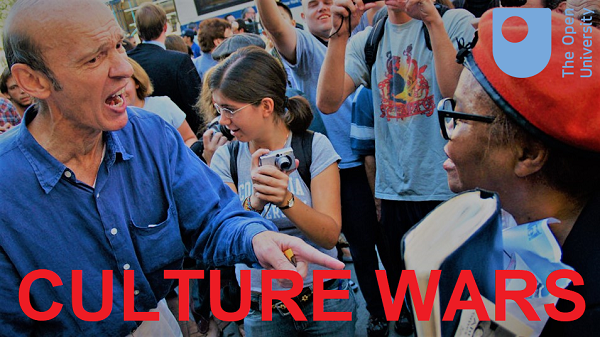By Paul-Francois Tremlett. Part 1 of a series.
The recent election of Donald Trump to Presidential office in the USA and the referendum to leave the EU in Britain have been described as evidence for an outbreak of new culture wars. The term ‘culture wars’ has been used to describe conflicts in late 19th century England and late 20th century America between secular and religious populations over issues such as gender and sexuality and the status of religious and scientific truth-claims. The rise of the self-styled new atheism was arguably part of the same phenomenon.
Interestingly, the linkage of Trump and Brexit to a new bout of culture wars has no obvious link to any religion-secular flashpoints. The 2016 report by Kirby Swales on the Brexit vote by the National Centre for Social Research concluded that “the EU Referendum was highly divisive, highlighting a wide range of social, geographical and other differences in Great Britain. This was less a traditional left-right battle, and more about identity and values (liberalism vs authoritarianism). It is a strong sign that the so-called ‘culture wars’ of the US have arrived in Great Britain in earnest” (2016: 27). Rich Lowry in The Guardian argued in similar fashion that Trump’s election in the USA exposed new fissures around populism, immigration and nationalism. But, if the new culture wars do not reproduce the religious-secular flash-points of the past, what do they do?
A key feature of the Trump and Brexit election campaigns were claims about fake news and alternative facts. If the arch-postmodernists Jean Baudrillard and Jean-François Lyotard are to be believed, this is because the modern narrative of incremental progress and knowledge is breaking down—if not, indeed, going into reverse. Where classical sociology predicted secularization—a terminal loss of faith in religious institutions—postmodern sociology predicts a loss of faith in all the other institutions as well, from the banks, universities, newspapers and courts to the politicians. The election of Trump and the Brexit vote point to this wider breakdown. The Occupy movement—about which I’ve conducted research in London and Hong and Kong (Tremlett 2012 and 2016)—registered global distrust in economic institutions. The camps that sprang up in cities around the world were attempts to find new sources of authenticity in speech and the face-to-face intimacies of camp life, and to imagine economies not in terms of competition, but rather cooperation. Ultimately, of course, the protests failed both in terms of their primary aim of bringing about political change to rein in the banks and in terms of their secondary aim of restoring peoples trust that they were part of a common society. But the movement did provide an imaginary which formed around the preference for close, horizontal relationships over distant, vertical or hierarchical ones.
The new culture wars, then, may not be about religion, but they are about faith and loss of faith: the loss of faith in existing institutions to speak sincerely and the process of trying to discover something or someone new to place trust in.
Bibliography:
Baudrillard, J. (2007) In the Shadow of the Silent Majorities, (trans), P. Foss, J. Johnston, P.
Patton and A. Berardini, Introduction, S. Lotringer, C. Kraus and H. El Kholti. Los Angeles: Semiotext(e).
Lyotard, J-F. (1984) The Postmodern Condition: A Report on Knowledge, (trans), G. Bennington and B. Masumi. Foreword by F. Jameson. Manchester: Manchester University Press.
Tremlett, P-F. (2012) ‘Occupied Territory at the Interstices of the Sacred: Between Capital and Community,’ in Religion and Society, 3: 130-141.
Tremlett, P-F. (2016) ‘Dissent in the Heart of the Capitalist Utopia: Occupy Hong Kong’s Rite of Post-Territorial Place-Making,’ in Sociology, 50 (6): pp. 1156-1169.
Note: This post is modified version of a presentation given to the Centre for Citizenship, Identities and Governance ‘Cultures and the Psychosocial in CCIG Research’ on May 4, 2017.

